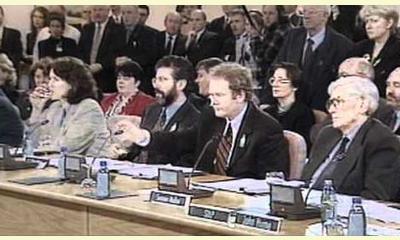|
|
The need for civil society in peace negotiations
an article by Adela Dumbravan
"You can imagine the peace agreement as being like the stones in a wall. The work of local, insider civil society constitutes the cement that holds those stones in place. Without the cement, the wall will fall down"
– Sara Pantuliano, Overseas Development Institute
Despite the effect peace negotiations have on civil society, civil society organisations (CSOs) are often forgotten at the negotiations table as, traditionally, negotiations to end armed conflicts are regarded as a job for governments and leaders of armed groups involved in the conflict, with concerned governments and international NGOs acting as conveners and mediators – and often behind closed doors, in a foreign location. However, a strong, organised civil society may prove to be critical for shaping peace, as it has the power to persuade, propose solutions and influence by example and by the integrity of their moral voice.

Scene from the peace accords in Northern Ireland
click on photo to enlarge
During my research study, I have found that participation of civil society in peace negotiations benefits the peace process, as:
* It lends legitimacy to the peace process by opening negotiations to a wider range of actors;
* It creates communication channels between the wider public and the official actors in negotiation, to articulate and include in the agenda the interests of social groups, especially marginalised groups;
* It can contribute creative solutions and innovative ideas through extensive expertise;
* It provides easier access to sensitive sources and places otherwise restricted to official actors.
Drawing on Track One experiences of civil society involvement in five peace processes (Northern Ireland, Guatemala, Liberia, Israel-Palestine and Colombia), I found that some key internal attributes contribute to a more effective participation in the complex process of peace negotiations: the structure of the organisation, its strategy and issues addressed in the talks, the types of activities undertaken and the degree to which it maintains good relationships with the other actors involved in the peace process. These four factors, when they are clearly determined and focused on specific objectives, finely shape CSOs’ effectiveness at the negotiations table. Conversely, when they appear to be weak, unorganised and not clearly defined, they reduce effectiveness.
Civil society participation in peace negotiations also shows weaknesses and limitations: limited organisational capacity and access to funding, weak networking and coordination mechanisms amongst CSOs, different motivations and contributions, tense relations with government and other actors. Some of them were solved by a better distribution of resources and adopting a functional communication and coordination strategy (e.g. the Civil Society Assembly in Guatemala). Others, such as the external challenges pertaining to the context in which CSOs operated, were matched by the diversity of skills that CSO’s brought to bear in peace processes, which facilitated the establishment of the conditions for talks, built confidence between the parties, shaped the conduct and content of negotiations and ultimately influenced the sustainability of peace agreements (e.g. the Northern Ireland Women’s Coalition in Northern Ireland).
The comparative experiences analysed shows that peace negotiations with structured opportunities for broader public participation can widen the range of issues addressed, can help produce legitimate peace agreements and strengthen the capacity for inclusive political participation in future governance.
Although civil society support cannot replace political action, it critically shows contributions towards advancing and securing peace, and may prove to be the strong cement that holds a peaceful society together.
This article is continued in the discussion.
|








|
DISCUSSION
Question(s) related to this article:
Civil Society in Peace Negotiations, What are the lessons learned?
* * * * *
Latest reader comment:
Here are some of the lessons learned from my research study on the participation of civil society in peace negotiations.
Lessons for civil society actors
A peace movement cannot simply be critical. It needs to create concrete proposals for the negotiating table, to have lobbying capacity and define strategic alliances with other actors at the negotiation table
CSOs must have an effective coordination and communication strategy within the organisation and with other civil society representatives
Influence is vital; securing it does not necessarily have to be done using political means
CSOs should mind the gap between them and the political leaders. They must understand the pressures placed upon Track One actors
CSOs should place emphasis on commonalities rather than disagreements with other actors, especially at the negotiation table
Civil society should strive to gain trust of Track One actors through straightforwardness and determination.
Lessons for state actors
Open the negotiations. Given that decisions taken in peace negotiations affect the lives of all people within one conflict, Track One actors should consider including representatives of non-combatant parties at the negotiation table and listening to their concerns and proposals
Put effective process mechanisms in function. Track One actors should explore the possibility and appropriateness of multi-party representative negotiations, multisectoral consultation processes, direct mass participation or nominal participation of civil society in direct peace negotiations
Support civil society as peace advocates. Track One actors should provide political, financial and technical support as appropriate to civil society, especially when they are operating in a hostile environment. Their voices can play an important role in preparing the public and increase the legitimacy of the peace process.

|
|









